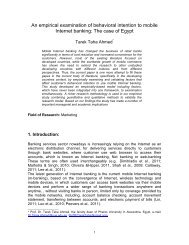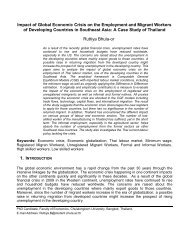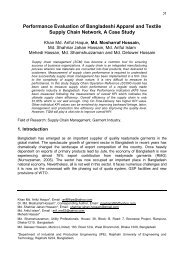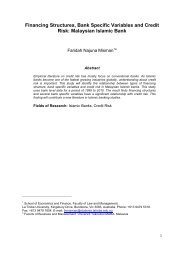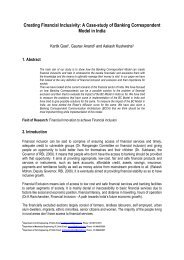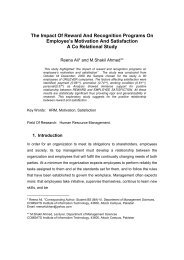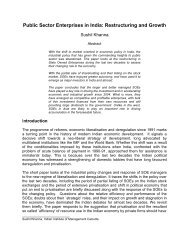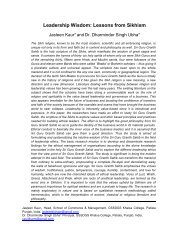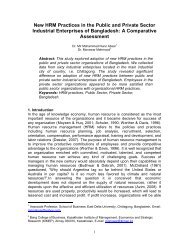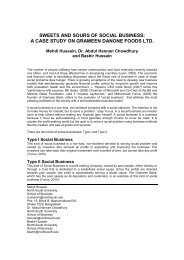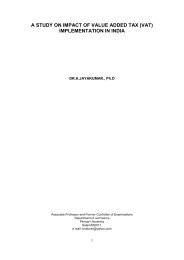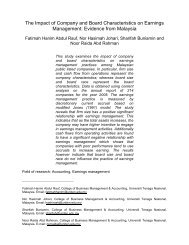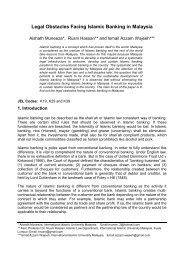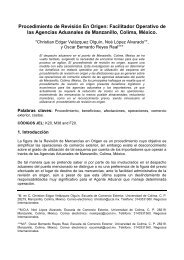Factors Affecting the Green Housing Purchasing
Factors Affecting the Green Housing Purchasing
Factors Affecting the Green Housing Purchasing
Create successful ePaper yourself
Turn your PDF publications into a flip-book with our unique Google optimized e-Paper software.
2. Literature Review<br />
2.1 Theory of Planned Behavior (TPB)<br />
This study employed “Theory of Planned Behavior (TPB)” developed by Ajzen (1991) as a<br />
tool in modeling intention to buy a green housing. TPB, introduced for <strong>the</strong> first time by Ajzen<br />
(1985), was developed from <strong>the</strong> <strong>the</strong>ory of reasoned action (TRA) which was accepted as<br />
<strong>the</strong> first <strong>the</strong>ory that tried to explain and forecast human behavior. Due to weakness of TRA<br />
forecasting ability, Ajzen later developed TPB by adding a variable reflecting a person’s<br />
perceived behavior control and TPB outperformed TRA in predicting and explaining human<br />
behavior. Han and Kim (2010) studied customers’ decision to stay in a green hotel by<br />
adopting TRA and TPB. They found that TPB can predict customers’ behavior on staying in<br />
a green hotel more accurately than TRA. Under TPB, Ajzen (1985) mentioned that<br />
important factors which influenced person’s behavior intention and his/her specific behavior<br />
are attitude towards behavior, subjective norm, and perceived behavior control.<br />
2.1.1 Attitude towards <strong>the</strong> behavior (ATB)<br />
Attitude towards behavior is <strong>the</strong> degree of an individual’s favorable or unfavorable on<br />
performing a behavior (Tonglet, Phillips, and Reed, 2004), or an individual’s overall<br />
evaluation of a specific behavior (Han, Hsu and Sheu, 2010). According to Ajzen and<br />
Fishbein (2004), general attitude has lower power than both positive and negative attitude<br />
in predicting a particular behavior. ATB, thus, is self evaluation towards a particular<br />
behavior which will reflect beliefs of a person on <strong>the</strong> perceived outcomes or benefits that a<br />
person will get from expressing that behavior (Ajzen, 1991; Shim, Eastlick, Lotz and<br />
Warrington, 2001). Many research papers found a positive relationship between attitude<br />
towards behavior and behavior intention, for example, in <strong>the</strong> field of physical activity<br />
(Jackson, Smith and Conner, 2003; French et al., 2005), internet stock trade (Gopi and<br />
Ramayah, 2007), and online shopping (Shim et al., 2001). Some researchers have studied<br />
factors affecting behavior intention in a household recycling behavior, green hotel<br />
repurchasing, and green product consumption, <strong>the</strong>y found a positive relationship between<br />
an affective attitude towards behavior and behavior intention (Tonglet et al., 2004; Han and<br />
Kim, 2010; Kim and Han, 2010).<br />
2.1.2 Subjective norm (SN)<br />
Subjective norm is awareness of social pressure affecting an individual’s behavior intention.<br />
Such pressure is perceived as important influence to attitude or behavior (Ajzen, 1991;<br />
Tonglet et al., 2004; Han and Kim, 2010; Kim and Han, 2010). Subjective norm is a function<br />
of normative beliefs. It is an individual’s beliefs affected by important o<strong>the</strong>rs such as family<br />
members who think that an individual should or should not perform a particular behavior<br />
(Rivis and Sheeran, 2003). Moreover, it also plays an important part in determining<br />
environmentally friendly behavior. According to <strong>the</strong> study by Gupta and Ogden (2009),<br />
even though consumers have positive attitude towards an environmentally friendly or green<br />
consumption, <strong>the</strong>y may not buy a green product. Their study signified to <strong>the</strong> influence of <strong>the</strong><br />
reference groups, or subjective norm on a particular behavior. Han et al. (2010) had studied<br />
<strong>the</strong> green hotel choice and found that subjective norm had played an important part on an<br />
individual’s decision to stay in a green hotel. The result is consistent with a study done by<br />
2



